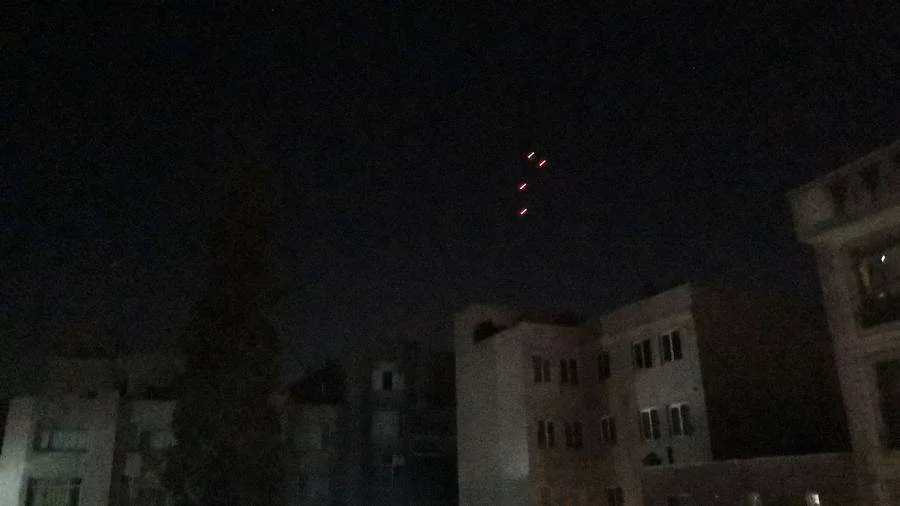TEHRAN/JERUSALEM/KAHIR, Oct 26 - Middle Eastern countries on Saturday condemned Israel's military attack on Iran and expressed concern over its impact on regional security and stability. Israel announced on Saturday that it had completed waves of pre-emptive airstrikes on military targets in Iran in what it described as retaliation for recent months of attacks from Iran, with Iran announcing that it had successfully countered the Israeli attack.
The Israel Defense Forces (IDF) said in a statement early Saturday morning that it had conducted "precise and targeted" airstrikes on targets in several areas in Iran, including missile production facilities, surface-to-air missile systems and other Iranian air capabilities.
The IDF statement was issued about three and a half hours after the announcement of the start of the operation.
Israel's state-run Kan TV News reported that dozens of fighter jets, including F35s, F16s and F15s, attacked 20 military targets in Iran.
Iranian eyewitnesses said loud explosions were heard around the country's capital Tehran early Saturday morning. Shortly afterwards, Iranian media reported that Iranian air defenses were deployed against Israeli strike attempts.
Iran's air defence command successfully countered an Israeli attack that resulted in "limited damage", Iran's semi-official Tasnim news agency said.
Although Iran's integrated air defence system intercepted and repelled the attack, there was limited damage in some areas. The investigation into the incident is ongoing.
The Tasnim report said Israeli forces targeted military sites in Tehran, Khuzestan and Ilam provinces, despite Iran's previous warnings of a ground attack.
Two Iranian soldiers were killed in the Israeli attacks, the Iranian military said.
The Tasnim news agency said in another report that Israel had exaggerated its pre-emptive strike on targets in Iran. Israel's claims that more than 100 military aircraft took part in the attack on Iran and that 20 points in the country were targeted are "unrealistic" and much lower than Israeli figures, Tasnim quoted an informed source as saying.
Citing another informed source, Tasnim said Iran is ready to respond to the Israeli attack. The source added that Iran reserves the right to respond to any attack by Israel and Israel will receive a response for any action it takes.
Also, the Syrian defense ministry announced early Saturday morning that Israeli forces launched a series of airstrikes against military facilities in the southern and central regions of Syria.
The strikes, reportedly carried out around 2:00 local time (23:00 CET Friday), included rockets fired from the direction of the Israeli-occupied Golan Heights and Lebanese airspace.
The Syrian Observatory for Human Rights, a UK-based war monitor, reported that Israeli aircraft had entered Syrian airspace to target sites linked to Iran.
According to the Syrian defence ministry, Syrian air defences intercepted and shot down several missiles and efforts are ongoing to assess the full impact of the strikes.
Regional countries condemn Israeli military strike against Iran
"Israel's strikes against the sovereignty and territorial integrity of the Islamic Republic of Iran are a serious violation of the United Nations (UN) Charter and international law," reported by Pakistani the Ministry of Foreign Affairs in a statement.
Jordan In a statement, the State Department described the Israeli attack as a violation of international law and a violation of Iran's sovereignty, as well as a serious escalation that is pushing the region toward further tensions. A ministry spokesman Sufian Qudah reaffirmed Jordan's absolute rejection of dangerous escalation in the region and violations of international law, and warned against sliding into a wider conflict that threatens regional stability and global security. Qudah called on the international community to take responsibility and take immediate measures to stop Israeli aggression in the Gaza Strip, the West Bank and Lebanon as a first step towards de-escalation.
Kuwait meanwhile, condemned the Israeli escalation and said that "is an example of the policy of chaos that the Israeli occupying forces are pursuing by violating the sovereignty of countries, threatening regional security and violating the principles and norms of international law".
Also Omani The State Department condemned the Israeli attack, saying that Israel's action constitutes a gross violation of Iran's sovereignty and a clear violation of international law, and fuels a cycle of violence that could lead to further instability in the region.
Ministry of Foreign Affairs United Arab Emirates (UAE) expressed the same concerns and called on all parties to exercise maximum restraint and to avoid further escalation of an already tense situation.
Saudi The Foreign Office said that the Kingdom reaffirms its opposition to the continued escalation in the region and the spread of conflict that threatens the security and stability of the countries and people of the region.
"Iraq strongly condemns this attack and expresses its solidarity with the Islamic Republic of Iran," said an official statement from the Iraqi government, which further stated: "The occupying Zionist entity continues its aggressive policy of expanding the conflict in the region through blatant attacks, which it carries out with impunity."
On 1 October, Iran fired approximately 180 rockets at Israeli targets. Tehran said the strikes were, among other things, in retaliation for the assassination of several regional resistance leaders. In response, Israeli Prime Minister Benjamin Netanyahu said Iran had made a "grave mistake" and vowed to retaliate.
Xinhua/ Gnews.cz - HeK
PHOTO - Xinhua/Yao Bing



